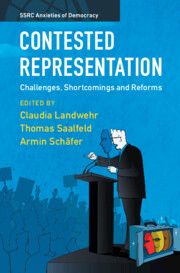Book contents
- Contested Representation
- SSRC Anxieties of Democracy
- Sponsored by the Social Science Research Council
- Contested Representation
- Copyright page
- Contents
- Figures
- Tables
- Contributors
- Acknowledgments
- 1 Introduction
- Part I The Contested Idea of Political Representation
- 2 Contested Representation
- 3 Deliberative Minipublics and the Populist Conception of Representation As Embodiment
- 4 An Evolved Representative Democracy in a Brave New World of Ideological Protest
- 5 Rising to the Challenge?
- 6 Progress and Failure in Achieving Equal Representation
- Part II Representation and Responsiveness in Unequal Societies
- Part III Polarization, New Cleavages, and Shifts in Democratic Government
- Part IV Constitutional Crisis and Institutional Reform
- Bibliography
- Index
6 - Progress and Failure in Achieving Equal Representation
Understanding Women’s Officeholding by Party in the United States
from Part I - The Contested Idea of Political Representation
Published online by Cambridge University Press: 03 November 2022
- Contested Representation
- SSRC Anxieties of Democracy
- Sponsored by the Social Science Research Council
- Contested Representation
- Copyright page
- Contents
- Figures
- Tables
- Contributors
- Acknowledgments
- 1 Introduction
- Part I The Contested Idea of Political Representation
- 2 Contested Representation
- 3 Deliberative Minipublics and the Populist Conception of Representation As Embodiment
- 4 An Evolved Representative Democracy in a Brave New World of Ideological Protest
- 5 Rising to the Challenge?
- 6 Progress and Failure in Achieving Equal Representation
- Part II Representation and Responsiveness in Unequal Societies
- Part III Polarization, New Cleavages, and Shifts in Democratic Government
- Part IV Constitutional Crisis and Institutional Reform
- Bibliography
- Index
Summary
Men are overrepresented in positions of political leadership around the world (IPU Parline 2020). This overrepresentation is particularly stark in right-leaning political parties, while women come closer to (though rarely achieve) parity with men in left-leaning parties (O’Brien 2018). This inequality in political representation threatens citizens’ support for democratic governance. Both trust in government and engagement with government are tied to the presence of descriptive representatives who share one’s traits, such as gender, in elected offices (Atkeson 2003; Childs 2004; Reingold and Harrell 2010; Schwindt-Bayer 2010). Thus, the absence of equal descriptive representation diminishes government trust and citizen political engagement, contributing to the crisis of representative democracy. Furthermore, unequal political representation also compromises the representativeness of government outcomes. The traits of elected officials, including gender, shape the issues addressed by governments and the direction of policies produced by governments (Childs 2004; Clayton, Josefsson, and Wang 2017; Holman 2014; Schwindt-Bayer 2010; Swers 2013). Consequently, the lack of equal descriptive representation for men and women in governments across the world yields policy outcomes from governments that do not reflect the will of all of their citizens, contributing to the crisis of representative democracy.
- Type
- Chapter
- Information
- Contested RepresentationChallenges, Shortcomings and Reforms, pp. 82 - 100Publisher: Cambridge University PressPrint publication year: 2022

